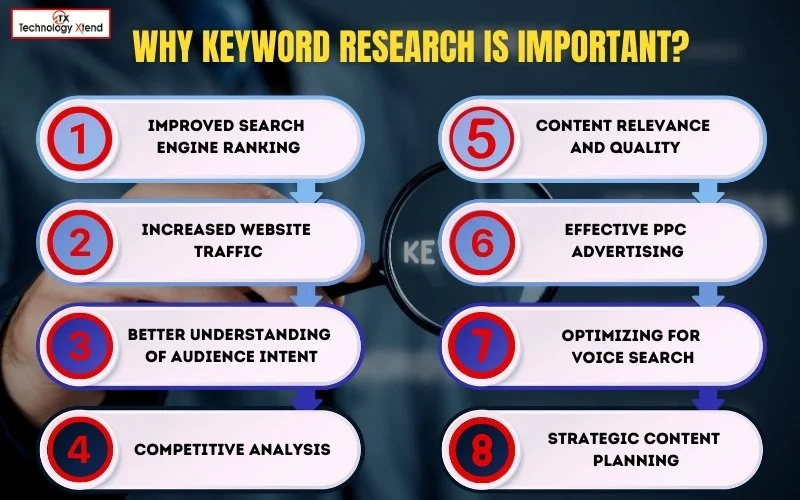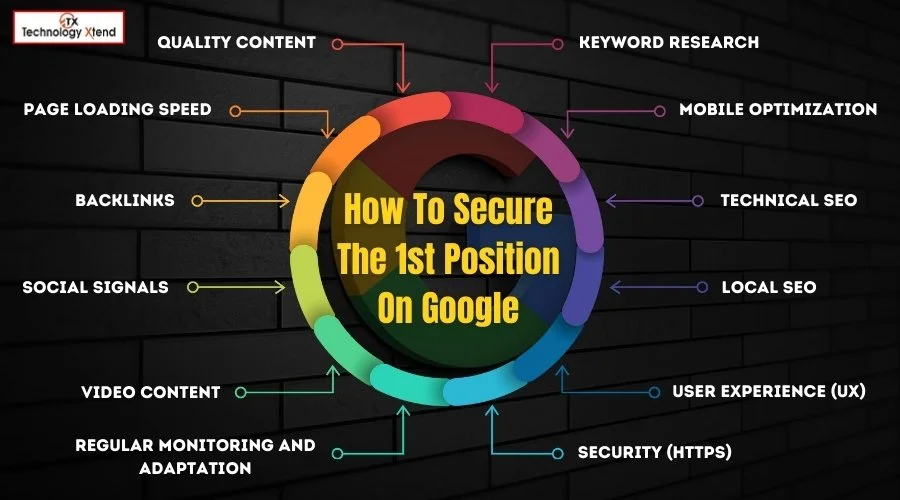
Technology XtendHow to Secure the 1st Position on Google in 2024
Discover the game-changing SEO strategies that will propel your website to the top of Google's rankings in 2024!
Imagine the thrill of seeing your keyword proudly displayed in the coveted 1st position of Google's search results. A top-ranking position not only boosts your online visibility but also drives organic traffic and increases opportunities for conversion. In this comprehensive guide, we will walk you through the essential steps to achieve a 1st position ranking for your keyword on Google in 2024. Get ready to unleash your SEO superpowers!
"Want to secure the top spot on Google in 2024? Unlock your SEO superpowers with this ultimate guide. Dominate the digital realm and revolutionize your online presence!”
Understand Keyword Research
Before diving into the world of SEO, it's crucial to conduct thorough keyword research. Start by identifying which keywords your target audience is searching for. You can use tools like Google Keyword Planner, SEMrush, and Ahrefs to discover relevant and high-ranking keywords for your niche. Pay close attention to search intent and analyze your competition to find the best keywords to target.
What is Keyword Research?
It's the process of identifying and analyzing the specific words and phrases that people use to search for information online related to your niche or target audience. These keywords act as a map, guiding you towards creating content, ads, and marketing strategies that resonate with your audience and attract more visitors to your website.
Why is it Important?
- Relevance: It ensures you're targeting the right audience with your content, increasing the chances of them finding and engaging with it.
- Visibility: By targeting relevant keywords with good search volume, you optimize your content for search engines, potentially ranking higher in search results and driving organic traffic.
- Insights: Keyword research reveals valuable information about your target audience's intent, interests, and pain points, allowing you to tailor your content and marketing accordingly.

How to Conduct Keyword Research:
- Brainstorm Seed Keywords: Start with broad terms related to your niche or target audience.
- Use Keyword Research Tools: Tools like Google Keyword Planner, Ahrefs, and SEMrush offer extensive keyword suggestions and data analysis.
- Analyze Search Volume and Competition: Choose keywords with good search volume but manageable competition for easier ranking.
- Consider Long-Tail Keywords: Longer, more specific phrases provide better targeting and potentially less competition.
- Refine and Explore: Continuously evaluate and adjust your keyword strategy based on performance and new insights.
Also Read - Top 10 Tips For Ranking Your Website #1 In Google Search
On-Page Optimization Strategies
On-page optimization plays a vital role in attracting organic traffic and ranking higher in search results. Here are some key strategies to optimize your web pages:
Content:
- Create high-quality, informative, and engaging content: This is the foundation of on-page optimization. Offer valuable information that resonates with your target audience and solves their problems.
- Target relevant keywords strategically: Research and incorporate relevant keywords into your content naturally, without keyword stuffing. Use long-tail keywords for better targeting and less competition.
- Structure your content clearly: Utilize headings, subheadings, and bullet points to improve readability and scannability.
- Optimize content length: While there's no magic formula, aim for longer content (1000+ words) that comprehensively covers the topic.
Technical Aspects:
- Optimize page titles and meta descriptions: Write compelling titles and descriptions that accurately reflect your content and encourage clicks. Include relevant keywords naturally.
- Optimize URLs: Keep URLs short, descriptive, and keyword-rich. Avoid special characters and use hyphens instead of underscores.
- Optimize images: Use descriptive alt text for images to improve accessibility and search engine understanding. Consider image size and compression for faster loading times.
- Improve website speed: Ensure your website loads quickly on all devices. Use website speed testing tools and implement optimization techniques like image compression and caching.
- Make your website mobile-friendly: Responsive design is crucial for a positive user experience across all devices. Google prioritizes mobile-friendly websites in search results.
User Experience:
- Internal linking: Link to relevant pages within your website to improve navigation and user engagement.
- External linking: Link to authoritative websites on related topics to demonstrate credibility and provide additional resources.
- Use multimedia: Incorporate images, videos, and infographics to break up text and enhance visual appeal.
- Optimize for readability: Use clear and concise language, avoid jargon, and format your content for easy reading.
- Add calls to action: Encourage users to take specific actions, like subscribing, contacting you, or making a purchase.
Additional Tips:
- Track your results: Use analytics tools to monitor website traffic, keyword rankings, and user engagement. Identify areas for improvement based on data insights.
- Stay updated: Search engine algorithms and user behavior are constantly evolving. Stay informed about updates and adapt your optimization strategies accordingly.
- Be patient: On-page optimization is an ongoing process. It takes time to see results, so be persistent and focus on continuous improvement.
Mobile and User Experience Optimization
In our mobile-driven world, optimizing your website for mobile devices is paramount. Here's how you can enhance mobile and user experience:
- Designing responsive web pages: Ensure your website design is responsive and adapts seamlessly to various screen sizes, browsers, and orientations.
- Enhancing user experience: Create an intuitive and user-friendly interface that allows visitors to navigate easily through your website. Utilize clear and logical menu structures, clickable buttons, and intuitive layouts.
- Optimizing website speed: Users expect fast-loading websites, and so does Google. Minimize unnecessary scripts, optimize code, and leverage caching techniques to improve your website's loading speed.
- Ensuring compatibility with voice search: Optimize content to accommodate voice search queries by incorporating conversational language and long-tail keywords. Consider creating FAQ-style content that directly addresses common voice search questions.
Building High-Quality Backlinks
What are Backlinks?
Simply put, backlinks are links from other websites pointing to yours. Search engines interpret backlinks as endorsements, indicating your website's relevance and authority. Higher quality and relevant backlinks from trusted websites hold more weight and lead to better ranking outcomes.
Why are High-Quality Backlinks Important?
- Improved Search Engine Ranking: Strong backlink profiles signal authority and trust to search engines, potentially boosting your website's ranking for relevant keywords.
- Increased Website Traffic: Backlinks from relevant websites drive traffic as users click through to your site, expanding your reach and audience.
- Enhanced Brand Credibility: Backlinks from reputable sources create an association with authority and trustworthiness, positively impacting your brand image.
Strategies for Building High-Quality Backlinks:
- Create Valuable Content: Focus on creating in-depth, informative, and engaging content that others would naturally want to link to.
- Guest Blogging: Contribute high-quality articles to relevant websites with engaged audiences, gaining valuable backlinks and exposure.
- Broken Link Building: Find broken links on relevant websites and offer your updated content as a replacement, earning a backlink while helping the site owner.
- Infographics and Visual Content: Create shareable and informative infographics or visuals that others might embed on their sites, linking back to yours.
- Become a Source for Reporters and Bloggers: Establish yourself as an expert in your niche by offering quotes, insights, or data to journalists and bloggers, securing backlinks in their articles.
- Directory Submissions: Submit your website to relevant online directories, building basic backlinks and online presence.
- Link Reclamation: Identify unlinked brand mentions online and reach out to website owners, requesting a backlink with credit.
- Utilize Social Media: Promote your content on social media platforms to increase visibility and potentially attract backlinks from others who find it valuable.

Here is how to build high-quality backlinks:
- Identifying authoritative websites and influencers: Research websites and influencers that operate in your niche. Look for high-quality and relevant sources that could potentially link back to your content.
- Creating valuable and shareable content: Develop high-quality, informative, and engaging content that others will naturally want to link to. Publish articles, infographics, case studies, or other resources that establish you as an authority in your field.
- Guest posting and blogger outreach: Reach out to influential bloggers in your niche and offer to write guest posts for their websites. This can help you attract targeted traffic and gain valuable backlinks.
- Content syndication strategies: Share your content on reputable platforms, such as Medium or LinkedIn Pulse, to reach a broader audience. Be sure to include a link back to your website within the content or author bio.
- Leveraging social media for link building: Promote your content through social media channels to expand its reach and increase the likelihood of it being shared and linked to.
Remember:
- Quality over Quantity: Focus on acquiring high-quality backlinks from relevant and authoritative websites, rather than a large number of low-quality links.
- Avoid Paid Links and Link Schemes: Such tactics can harm your website's ranking and reputation, so stick to organic link building techniques.
- Be Patient and Persistent: Building high-quality backlinks takes time and effort. Be persistent in your outreach and content creation, and focus on long-term strategies.
Also Read - Explore SEO: Everything You Need to Know to Boost Your Online Presence
Tracking and Analytics
To monitor and optimize your SEO efforts, it's crucial to set up tracking and analytics tools. Follow these steps:
- Setting up Google Analytics and Google Search Console: Create accounts and link your website to both Google Analytics and Google Search Console. These free tools will provide invaluable insights into your website's performance.
- Monitoring organic traffic, bounce rates, and click-through rates: Regularly analyze your website's organic traffic, bounce rates, and click-through rates to understand user behavior and make informed decisions about areas that need improvement.
- Identifying popular landing pages: Analyze which pages on your website are frequently visited and how users are engaging with them. Optimize these pages further to maximize their effectiveness.
- Analyzing user behavior: Utilize analytics data to gain insights into user behavior, such as time spent on page, scroll depth, and exit rates. Look for patterns and areas for improvement.
- Continuous monitoring and tweaking: SEO is an ongoing process. Continuously monitor your rankings, analyze data, and make adjustments to your strategies accordingly.
In Conclusion
Related Articles









































